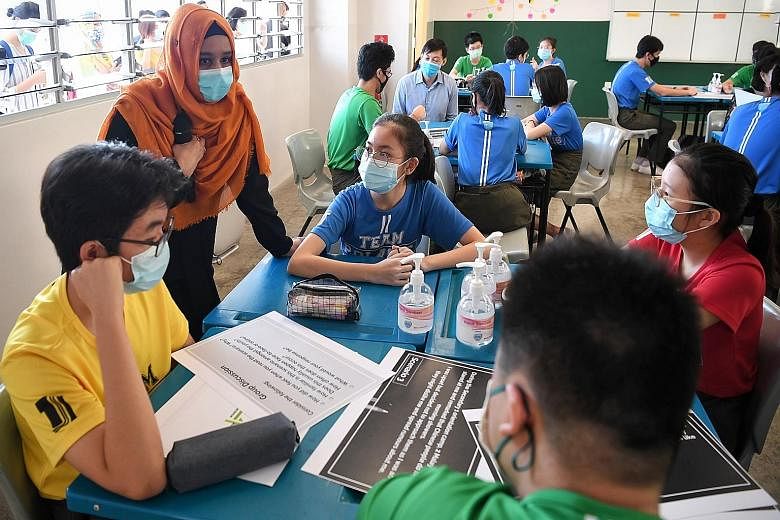Singapore's 15-year-olds claimed the top spot in an international test that assessed their capacity to understand and act on intercultural and global issues.
The Organisation for Economic Cooperation and Development (OECD), which conducted the test as part of the Programme for International Student Assessment (Pisa) study in 2018, announced the findings yesterday.
In what was called the Global Competence Test, Singapore students scored an average of 576 marks, followed by their peers from Canada who on average scored 554, Hong Kong (542), Scotland (534) and Taiwan (527).
About 46 per cent of the Singapore students who took the test achieved the highest global competency proficiency levels - 4 and 5. This is the highest proportion compared with the average 14 per cent across the 27 education systems which participated in the assessment.
The Ministry of Education (MOE) said to achieve proficiency levels 4 and 5, students had to demonstrate a strong ability to identify and analyse different perspectives, evaluate information to differentiate between biased and unbiased sources, assess situations and make connections across multiple activities within a problem.
Pisa is conducted every three years to assess students on their reading, maths and science skills, but in recent years, OECD has added more assessments on other skills, including collaborative problem-solving which was tested in Pisa 2015.
On the need to assess global competency, OECD said learning to participate in interconnected, complex and diverse societies is no longer a luxury, but a pressing necessity and that schools are "central" to the teaching of these skills.
The results of the 2018 maths, science and reading tests were released in December last year, with Singapore coming in second place after China.
In its statement, MOE said it had developed in 2010 the "21st Century Competency (21CC) framework" where it identified the knowledge, skills and values that are important for all students to thrive in the new economy and interconnected world.
Schools since then have provided both curricular and co-curricular learning experiences to develop competencies in these areas.
In the global competence study, Singapore students on average reported being exposed to eight out of 10 learning activities surveyed by Pisa, while the OECD average was five.
MOE said Singapore's language policies and programmes also contributed to the nurturing of global competency knowledge, skills and attitudes.
For example, the bilingual policy and other language programmes allow students to learn the language of another community at a conversational level. This has resulted in more than nine in 10 Singapore students having the ability to speak at least two languages, said MOE.
OECD noted that speaking multiple languages facilitates dialogue with people from other cultures, and promotes social cohesion.
MOE's deputy director-general of education (curriculum) Sng Chern Wei, said: "Recent events such as the Covid-19 pandemic, with its worldwide ramifications, have underscored the continued relevance of global competence."
MOE noted that students from the bottom quarter socio-economic status (SES) also did well in the assessment, with about 26 per cent performing at the highest two proficiency levels compared with the OECD average of 6 per cent.
It also noted that while Singapore students were most knowledgeable on topics such as climate change and global warming, they were less confident in explaining issues related to the global economy. For instance, only about half of them could establish a connection between prices of textiles and working conditions in the countries of production.
The ministry said schools will continue to provide all students with varied learning experiences, to help them develop their global competence knowledge and skills.
OECD director of education and skills Andreas Schleicher told The Straits Times that Singapore's performance in the global competence test is not surprising.
He said: "Whether it is the open and outward-looking curriculum, the active promotion of student exchanges or celebrating festivities of multiple cultures, few countries do more to help students see the world through different lenses, navigate different ways of thinking and appreciate different cultures and traditions.
"And the Pisa results show that those activities shape students' attitudes towards others and the world which, in turn, are reliable predictors for global competence."



